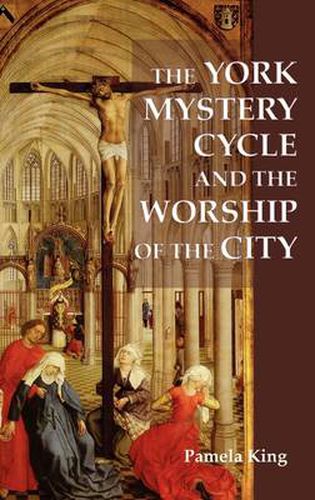Readings Newsletter
Become a Readings Member to make your shopping experience even easier.
Sign in or sign up for free!
You’re not far away from qualifying for FREE standard shipping within Australia
You’ve qualified for FREE standard shipping within Australia
The cart is loading…






WINNER of the 2007 David Bevington Prize
The York Play is the earliest near-complete English civic mystery cycle. It evolved constantly throughout its long performance history, but the text that was recorded in the YorkRegister shows that it was already a mature and elaborate civic festival by the time it was written down.
This study uncovers the Cycle’s connection with worship in York, in the sense both of devotional practice and of civichonour, informing a particular period in the cultural history of the city. The pageants in the Register show in their different ways how the community which devised and performed the Cycle regarded the celebration of the great summer feast of Corpus Christi. Moreover the principles of selection that give the Cycle its structure reflect the broader pattern of the liturgical calendar, with its other feasts and fasts. The Cycle bears witness not only to thepractices of religious observance in York, but also to the ecclesiastical politics in which the city was caught up from the very beginning of the fifteenth century.
PAMELA KING is Professor of Medieval Studies at the University of Bristol.
$9.00 standard shipping within Australia
FREE standard shipping within Australia for orders over $100.00
Express & International shipping calculated at checkout
WINNER of the 2007 David Bevington Prize
The York Play is the earliest near-complete English civic mystery cycle. It evolved constantly throughout its long performance history, but the text that was recorded in the YorkRegister shows that it was already a mature and elaborate civic festival by the time it was written down.
This study uncovers the Cycle’s connection with worship in York, in the sense both of devotional practice and of civichonour, informing a particular period in the cultural history of the city. The pageants in the Register show in their different ways how the community which devised and performed the Cycle regarded the celebration of the great summer feast of Corpus Christi. Moreover the principles of selection that give the Cycle its structure reflect the broader pattern of the liturgical calendar, with its other feasts and fasts. The Cycle bears witness not only to thepractices of religious observance in York, but also to the ecclesiastical politics in which the city was caught up from the very beginning of the fifteenth century.
PAMELA KING is Professor of Medieval Studies at the University of Bristol.